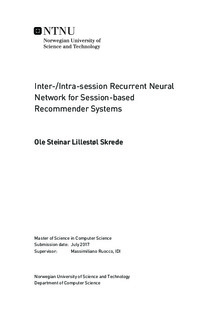Inter-/Intra-session Recurrent Neural Network for Session-based Recommender Systems
Master thesis
Permanent lenke
http://hdl.handle.net/11250/2462185Utgivelsesdato
2017Metadata
Vis full innførselSamlinger
Sammendrag
Recommender systems are useful to users of a service and to the company offering the service. Good recommendations can help users find what they are looking for faster, and they can help users discover new content. For businesses, the recommendations can improve user engagement. In recent years, research has been done on employing Recurrent Neural Networks (RNNs) within the case of recommender systems. Results have been promising, especially in the session-based setting where RNNs have been shown to outperform state-of-the-art models. In many of these experiments, the RNN could potentially improve it's recommendations by utilizing information about a user's past sessions, in addition to his interactions in the current session. A problem for session based recommenders, is how to produce accurate recommendations at the start of a session, before the system has learned much about the user's current interests.
We propose a novel approach that extends the existing RNN-based session-based recommender, making it able to process the user's recent sessions, in order to improve recommendations. This is done by using a second RNN layer to learn from recent sessions, and predict the user's interest in the current session. By feeding this information to the original RNN layer, the proposed solution is able to improve it's recommendations.
Our experiments on three different datasets, show that the proposed approach can significantly improve recommendations throughout the sessions, compared to a single RNN working only on the current session. The proposed model especially improves recommendations at the start of sessions, and is therefore able to deal with the cold start problem within sessions.
